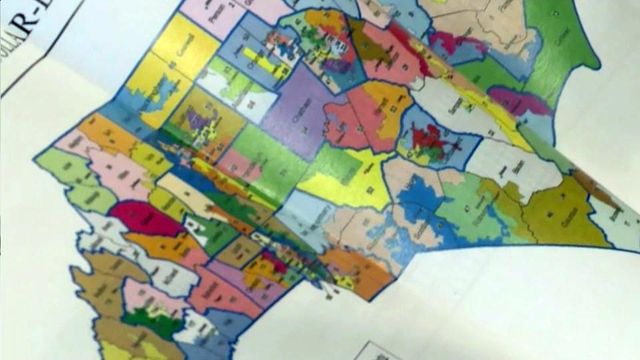Judges: No special elections, one month to redraw maps
The General Assembly has until Sept. 1 to redraw unconstitutional legislative districts, but no special election in the new districts will be held before next year's spring legislative session, a panel of three federal judges ruled Monday.
Posted — UpdatedDemocrats who fought the district lines successfully all the way to the U.S. Supreme Court had hoped to see an election before 2018, but they were pleased that the court set a tight timeline for the new maps. Republican lawmakers had proposed finishing the maps by mid-November.
"Clearly, the courts are frustrated with the General Assembly that they have not redrawn these districts," Gov. Roy Cooper said Tuesday. "They have given them a tight timeline to redraw. People deserve to know what district they're going to be in so they can decide whether they want to run (for office)."
Still, the judges agreed with legislators that there is benefit in holding public hearings first, and they rejected calls from plaintiffs in the case to require new maps within two weeks. They also said they would move the deadline to Sept. 15 if leadership publicly shows progress toward drawing fair maps.
Allison Riggs, senior attorney at the Southern Coalition for Social Justice, which represents the plaintiffs in the case, said lawmakers can easily meet the court's deadline. They don't need to – and should not – redraw any districts in areas that were not affected by the court ruling, she said.
"There's a fair amount of redrawing, but it's within these county groupings that we know about and have known about for a year and a half," Riggs said. "It's really not that hard of a task. The defendants' map drawer testified in court that he could do it in a few hours.
"Public hearings are only meaningful if there are maps out there already and members of the public can comment on it," she continued. "I think the court wanted them to focus in on what the task is at hand, which is unpack these districts, stop sorting voters on the basis of race and let voters know it's getting fixed."
Legislative leaders said Tuesday that their attorneys are still examining the ruling, so they weren't prepared to comment.
Robin Hayes, chairman of the North Carolina Republican Party, said he believes lawmakers will comply with the court's direction, and he's confident Republicans will maintain their veto-proof majorities under the new maps.
"We have lowered people's taxes – lowered the rates – increased teacher pay, given school choice, cut unemployment and recruited industry to the state," Hayes said. "The Democrats, they want new maps, but it wasn't the maps that caused them to lose.
"This is kind of a desperation move by our opponents. They can't win on policy," he added.
Once the maps are drawn, plaintiffs in the case can submit their own plans for the court to review. The court has the power to reject the maps and could end up drawing its own.
The legislature, the judges said, has the "right to draw the new districts in the first instance, if it will do so in a timely fashion."
This panel found 19 House and nine Senate districts unconstitutional last year, saying leaders relied too heavily on voters' race to set district lines in 2011. The resulting maps helped the GOP keep its veto-proof advantage in the House and the Senate, a grip Democrats hope to loosen with new maps in place.
Related Topics
• Credits
Copyright 2024 by Capitol Broadcasting Company. All rights reserved. This material may not be published, broadcast, rewritten or redistributed.






